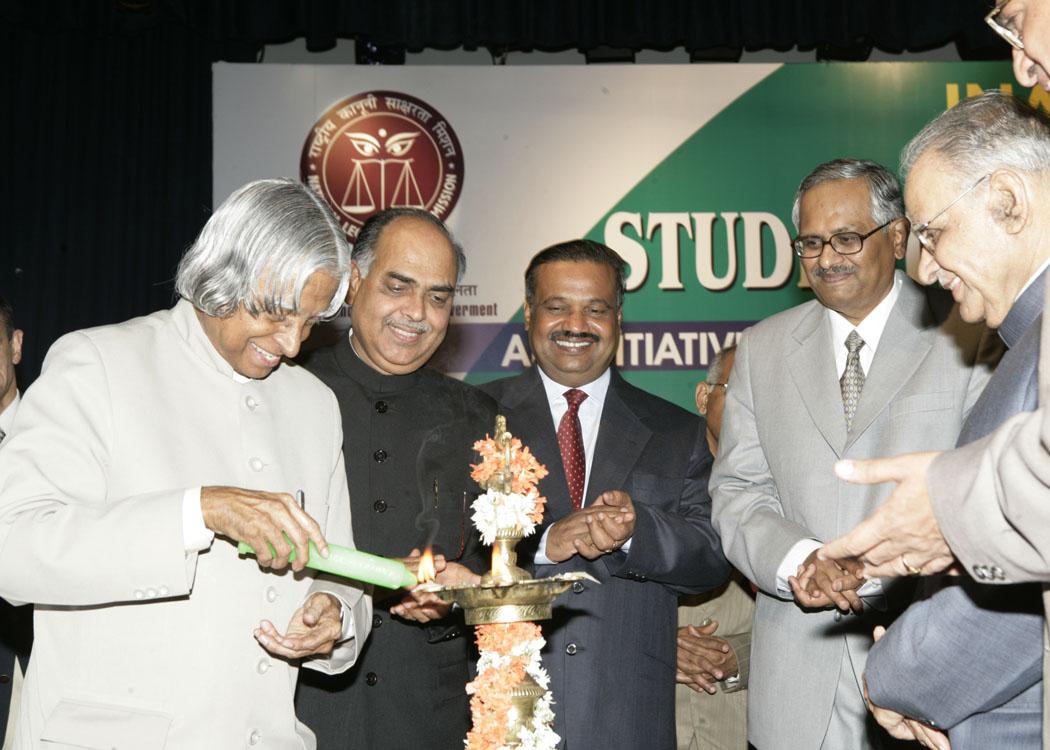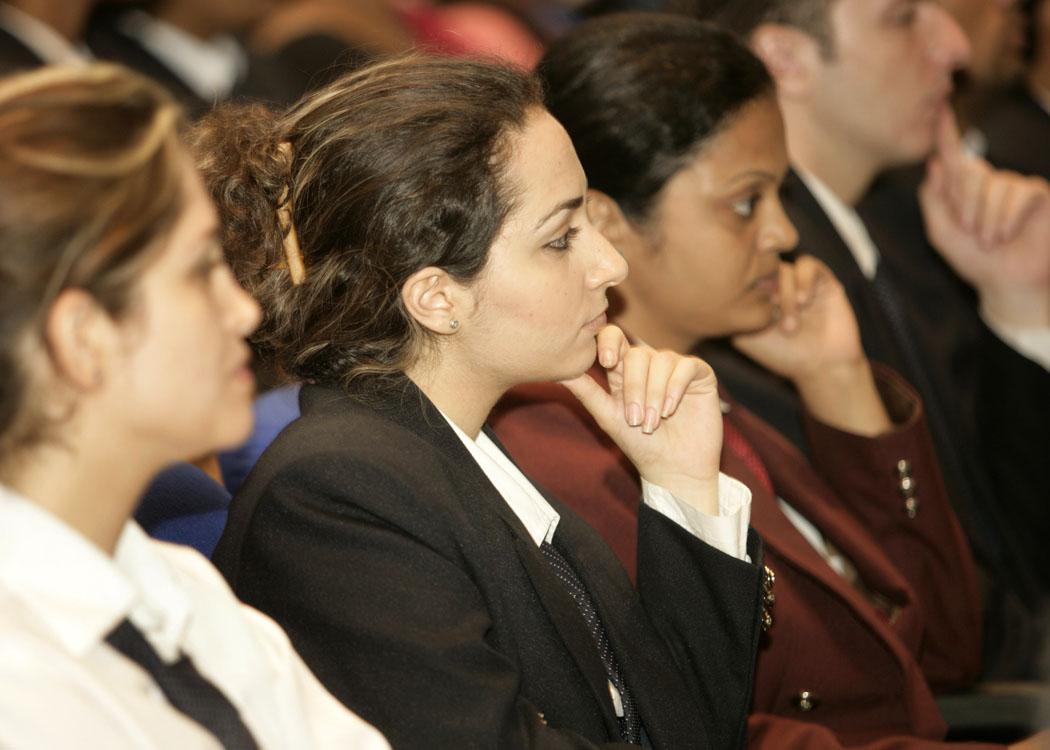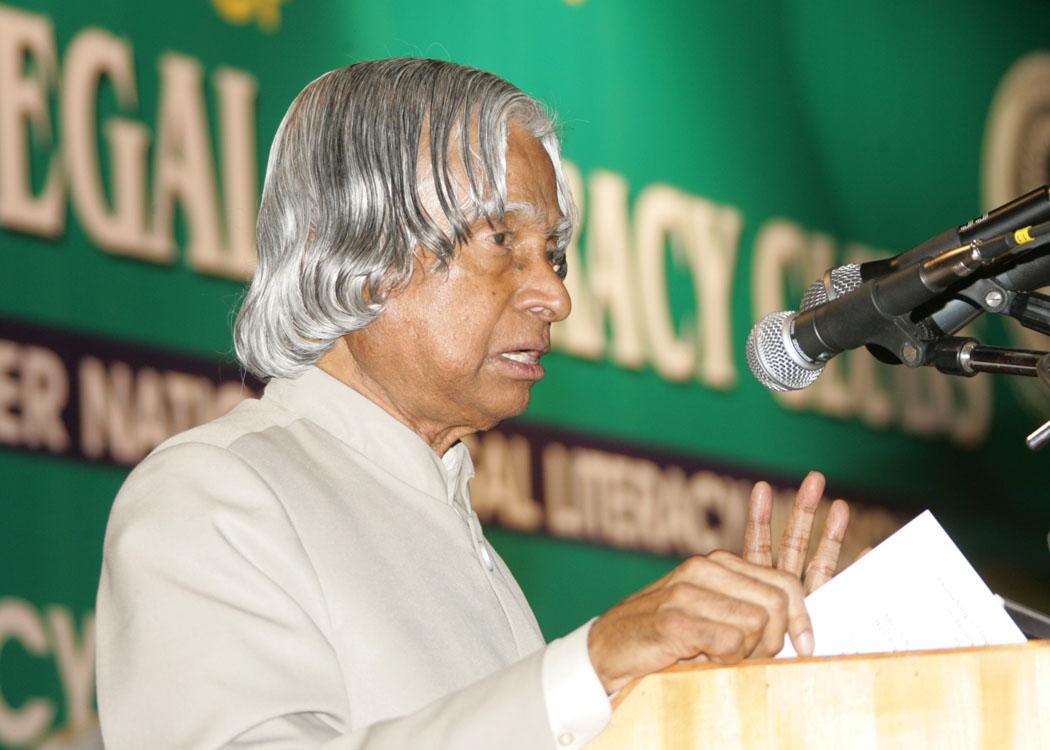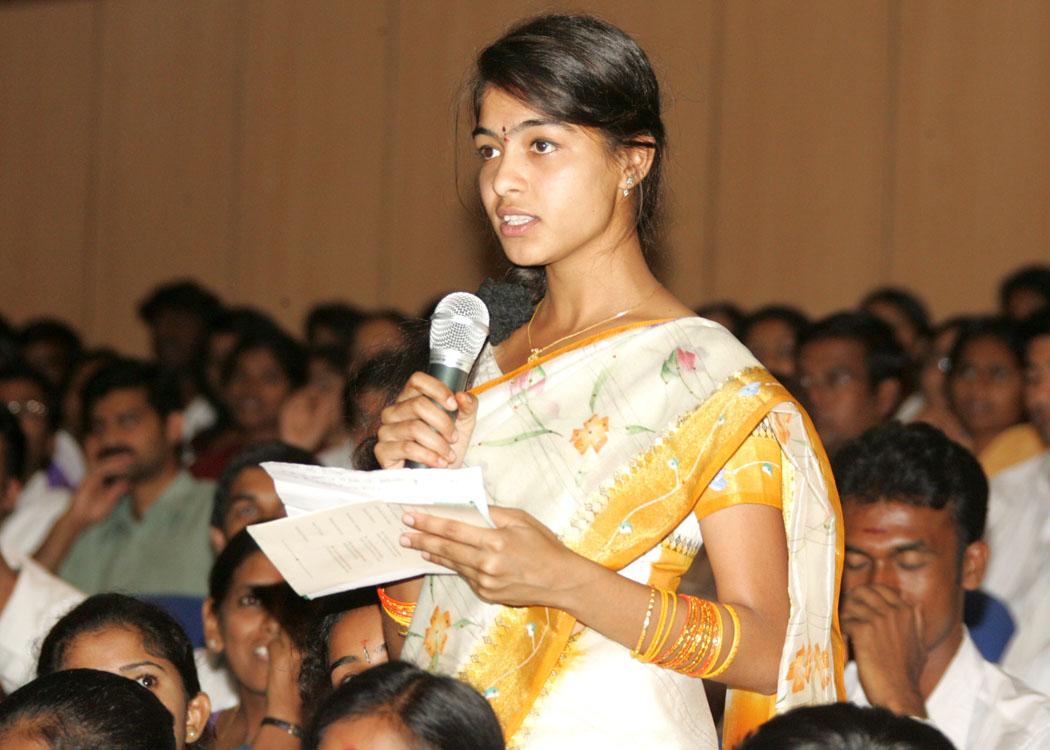Address At The Launching Of Students Legal Literacy Clubs, Bangalore
Bangalore : 07-04-2006
Societal harmony through legal Literacy
I am delighted to participate in the launching of the project Students Legal Literacy Clubs in various colleges in the State of Karnataka being organized by the Karnataka State Legal Services Authority. I greet the Hon?ble Chief Justice and Justices of Karnataka High Court, judicial officers, legal educators, students in large number, distinguished legal personalities, social organizations, citizens and other participants. Launching of Students Legal Literacy Clubs with an objective to motivate and sensitise the students community to combat social evils such as child violence, child abuse, child labour, child marriage, child trafficking and protection of women against gender sensitive crimes and dowry violence is definitely a good initiative. I would like to talk on the topic Societal harmony through legal Literacy.
Economic and Social Justice
Dear Students, let me share a thought on how justice is very important for national success. Every human being in this planet has a right to live with dignity and has a right to aspire for distinction while retaining one?s unique identity. The test of any legal framework depends on its capacity and efficacy to ensure social, economic and political justice for an individual not only in his individual capacity but also as a member of a nation or as a member of the global community. In other words, our individual and localized interests have to be harmonized within the larger pluralistic order so as to give primacy to human rights. It is necessary to work towards Unity of Minds. It is citizen?s responsibility to do everything possible to make our behaviour civilized to protect the rights of every individual, without stamping out their individual characteristics and basic identity. For a peaceful human life, law and justice have to assist. If justice fails to protect human rights, the nation fails. It is the responsibility of legal community to ensure that these elements of rights, justice, liberty, equality and fraternity become available to all. The Legal Literacy Clubs may like to discuss these elements.
Laws driven by national priorities
Dear students let me discuss with you how Laws are driven by national priorities. Opportunities for rapid industrial and economic growth today co-exist with new problems arising out of trade competition and corporate mergers and take-overs. Many tiny and small sectors of industries and even artisanal goods will be facing the forces of modernization in the form of market forces, technologies and other forms of public information system including advertisements. There are major issues of protecting the local and global environment. Let us look at science and technology which has emerged as a strong force during the current period of human history. Basically science and technology is driven by human curiosity and reasoning and in its best sense aimed at spreading benefits to all people. They are basically universal in outlook. Similarly, laws are meant to protect people, their rights and make them feel secure in the society. I think this is the common meeting ground of Law, Science and Technology, People and Society. Legal instruments to maximize the benefits for our people and nation are necessary. Laws must protect the indigenous technologies and trade to the extent they impact peoples living and their welfare as well as ensure national interest.
When I am with the students of legal literacy club, I would like to share with you three experiences that have relevance to providing justice in the rural areas with humane element.
Dispute resolution through human touch
During 1940's, when I was a school boy, every day after the evening namaz, my father used to come back and sit outside (thinnai) our home at Rameswaram. Each day about 10 to 20 families or at times individuals would come to my father and tell their problems on land and house disputes, marriage conflicts and issues involving forsaking of elderly parents. They will get a solution from my father within two or three days. In a similar way, my mother used to meet many womenfolk on Fridays. They will seek her advice. My elder brother himself was Panchayat Court President. The court had five good human beings from various walks of life and with one State Government representative. In those days, caste system was not visible at all in that region. I used to see many disputes of human life being settled in our own rural environment. Only if the disputes are not settled at these two levels they used to resort to higher courts. After 1970s, all these systems with human touch vanished and most of these disputes are going to courts. I feel, since the Panchayat environment is emerging in rural areas, the judicial system at the Panchayat level also can take a shape with the same type of human touch.
Eighty Litigation free villages in Chitrakoot is a good example to be followed by many districts. This will substantially reduce the load in our courts. Recently, I visited Deendayal Research Institute in Chitrakoot, Madhya Pradesh. There I found that the institute is facilitating a cohesive conflict free society. As a result of this, I understand that the eighty villages around Chitrakoot are almost litigation free. The villagers have unanimously decided that no dispute will find its way to the court. The differences will be sorted out amicably in the village itself. This has happened because of the inspirational leadership at Chitrakoot. This movement has to be encouraged in the rural areas by different State Governments. The Law students and other students who have exposure to legal training can impress upon the people in the rural areas to find solutions to their problems through a fair justice mechanism in the village itself. Now, I would like to discuss about the importance of Legal literacy among the citizens of the country and the role which can be played by the legal literacy clubs in promoting literacy.
Evolution of Enlightened Citizens
Every citizen of the country should be aware of his responsibilities towards the society and his/her rights. This will enable the citizens to be a law abiding person which is essential for promoting and maintaining harmony in the society. The awareness comes from literacy. Therefore, before we talk of legal literacy there is a need to improve the general literacy among all people in the country. Particularly we need to enhance the literacy level among women, so that, the women are empowered with knowledge. It will be easy to educate a literate women about her rights and responsibilities through Legal Literacy Clubs. Therefore I consider that legal literacy clubs can become an important element in societal transformation, particularly as an enabler of protecting the rights of women and weaker sections of the society.
Early introduction of legal education
I would suggest that the legal literacy should be introduced as a compulsory subject for senior secondary students at 10+2 level to acquaint the young generation of the nation with their legal rights in the society. The young adults are energetic and can carry the message of social reform in a concrete and tangible manner than other segments of the population. It is therefore in the interest of the welfare of the nation that we introduce legal education to this segment of the population. It will also enable the schools to enhance the legal knowledge of the students and train them as Law abiding citizens of the country, to respect Law and Order and the consequences they have to face in the event of violation or disobedience of law. This will definitely minimize and reduce the crime in the society to a certain extent, if such awareness is brought at an early age. The integration of the students community will also open up opportunities for safe childhood campaign. It will also promote social solidarity among the younger citizens who need to be sensitive towards the cause of the poor and the downtrodden and need to combat the social evils with the spirit of sportsmanship.
Conduct of Legal Seminars and Workshops
The students of the Law college, lawyers, and experienced judges can conduct legal literacy programmes in the form of Seminars and Workshops in schools and colleges. During these seminars typical cases can be presented through which the individuals can be made aware of the methods by which they can protect their rights and go to the right place for justice. This is particularly important for training the women for protecting themselves against crimes and enabling them to apprehend the criminals, so that the women in the society can lead a life free from and constant threat. The legal literacy will bring confidence and a sense of equality among women which is also the demand of equity, fairness, justice and equality to make their life meaning full and purposeful.
Prevention of corruption
Legal literacy will enable the members of the society to fight for their rights and prevent corruption which are rapidly in the society. This comes out the feeling that corruption is the only way through which they can solve their personal problems in time. If the individuals realize the damage they are creating to the society, they will be prepared to wait and get their problems solved through the right means instead of resorting to short cut methods of corrupting the system. Thus legal literacy can definitely be an important tool for eradicating corruption from our society which is essential for transforming India into a developed nation before 2020.
Legal Aid to the poor
One of the important objectives of legal literacy among the students should be to visit the villages on weekly holidays, meet the poor farmers and craftsmen living in the villages to get themselves apprised about the specific problems. With their legal knowledge they should help at least one poor villager in a month to solve his problem and protect his legal right. This type of help will enable him to lead a happy life in our society which is his birth right. Such timely help will also reduce the frustration and tension of the farmer and prevent occurrence of unintentional crimes and lead to the promotion of a harmonious society.
p> Legal Literacy for Self-Help Groups
The Self-Help Group members who are undergoing courses on tailoring, beautician and other vocational courses should be taught family Laws, marital Laws, maintenance and inheritance under the Hindu, Muslim and Christian legal systems. The provisions of consumer protection act, food and adulteration act and other relevant laws should also be explained to them. This will enable them to protect their lives and also become ethical entrepreneurs. The society should understand that many acts would not help women in getting justice unless the mindset of the society gets changed. Keeping in view the problems of child marriage and growing incidence of desertions, government may rigorously enforce compulsory registration of all marriages.
Research Areas
During the weekly meetings the literacy club can organize discussions on typical societal cases in which landmark Judgements have been given by five district courts, High Courts and Supreme Court in the last ten years. The proceedings of these discussions can become research areas covering many societal issues faced by the citizens in their day to day life, and the remedies which they can find for typical problems.
Conclusion
I am happy that considering the importance of colleges being the centres of learning Karnataka State Legal Services Authority has taken the initiative to integrate the students who can be catalytic agents for social transformation. A group of committed student volunteers in each college can work for legal empowerment of rural and urban people. The aim should be to make each college the nerve centre for a group of specialized legal aid counselors on different topics pertaining to the society such as crime against women, child labour, use of NDPS Act and human rights violations. These types of tasks will definitely make the members of the students? legal literacy clubs feel happy in solving day to day societal problems and work towards the creation of a litigation free happy society.
With these words I am happy to launch the Project "Students Legal Literacy Clubs". I particularly congratulate the Karnataka High Court for taking the initiative in creating this institution. I wish the members of the club success in their mission of promoting legal literacy among the masses leading to a happy and harmonious society.
May God bless you.
Question and Answer Session
1. How best is the object of Article 39-A of the Constitution of India can be achieved by involving the students community in the Legal Literacy Programmes ?
- Annie Jacob, IV B.A.L.L.B.
Ans: By understanding the provisions of Law and Act definitely the student community can help in their own family such a situation occurs or any people badly needed in the rural area. Definitely the students with background of legal literacy programme will know the routes to follow for getting justice.
2.What steps can be taken to arrest the decline of political morality?
- Renuka Prasad, B.Com II Semester
Ans: Youth with morality must enter political system and make a revolution. Will you do it?
3. Though we are living in the 21st Century, still baby girls are looked down by the society? Is there no end to this?
- Miss Vedashree G, B.Com II
Ans: Women education is the key.
4. Many call centers are luring boys and girls who have just completed 10+2 studies and thereby their future carrier is getting spoiled, Can something be done regarding this?
- Miss Azma, 10th Semester LLB
Ans. Call centres are professional work, however, learning process should continue.
5.Your proposal for Indian Institute of Science to start an under graduate course. Can we Diploma Students get a lateral entry to this course?
- Pushpa S., VI Sem. Electrical
Ans: First let the undergraduate course start. Then there are many possibilities.
6.As Students we would like to know what measures our scientists are taking to protect our sensitive installations shown on Google earth?
- Chaitra K.M., VI Sem.
Ans. Many actions are being taken.
7.Is a mere degree enough to call a person 'Culturally educated'?
- Amala R., VI Sem.
Ans: Education gives knowledge in a particular area, plus how to be a good human being. Both are properly learned he will become culturally educated person.
8.Is it right to book and arrest a person under the Dowry Prohibition just on a mere complaint?
- Miss Prabhavathi M.,
Ans: The Courts are studying the impact. I think fast action has to come.




